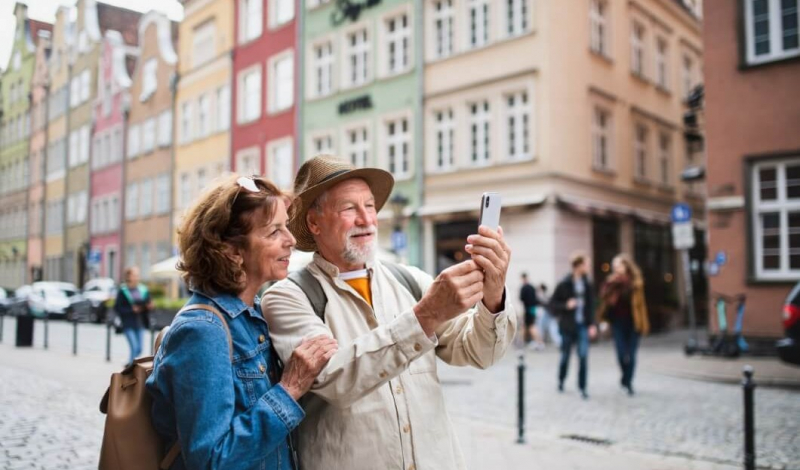Europe presents a kaleidoscope of travelers, from youthful backpackers finding sunsets in Santorini to seasoned adventurers sailing the Aegean. Studies, including those from the European Travel Commission, suggest a generational pattern underlies this wanderlust. We see that bigger budgets and travel spending tend to appear with age, while travel frequency often hits its stride in midlife; motivations subtly shift from just escaping to seeking deeper enrichment.
Interestingly, post-pandemic travel is rebounding, with average trip spending jumping from €334 in 2020 to €510 in 2023. These trends paint a picture of a tourism sector recovering and also changing, with age re-writing how we travel across Europe.
Trip Spending Grows Up
It’s pretty clear that money talks when it comes to travel, clearly showing divides between generations. Travelers over 65 spend the most, averaging around €568 per trip, significantly more than the €405 spent by 18- to 24-year-olds. This difference highlights how earning changes over a lifetime: younger people value experiences perhaps more than extravagance, whereas retirees might use their pensions for upgrades like business-class flights or nice hotels.
Most trips within Europe tend to be short, about four to six nights, mixing work with cost-effective travel plans. What about the overall rise in travel spending? Well, we can largely attribute that to inflation and pent-up demand — that €176 increase from 2020 to 2023 matches the rise in airfares, hotel costs, and simply enjoying travel again. For Gen Z, it’s often about finding the best deals, such as cheap flights and hostels, while older generations might enjoy the freedom to spend on whatever they want.
|
Age Group |
Avg. Spend per Trip (€) |
|
18-24 |
405 |
|
25-44 |
450 (est.) |
|
45-64 |
520 (est.) |
|
65+ |
568 |
Who Travels the Most?
Forget the old idea of never-ending student travelers – the data kinda shows that’s a myth. The 25-44 age group logs the most miles, with over 90% having traveled in the past year. This period, often combining career stability and family life, supports frequent travel, from weekend getaways to yearly vacations. It seems that travel frequency grows with financial security. While younger travelers might dip their toes in, those in midlife dive right in, and empty-nesters often keep it going.
Looking ahead, things look good. Over half of Europeans plan to travel within the next six months, rising to 75% among those aged 35-44 and 55-64. Concerns about climate change, along with the rise of hybrid work, are driving this — digital nomads are mixing work and vacation more than ever. As one travel expert put it, “Age isn’t a problem; it helps you be bold.”

From Relaxing to Soul-Searching
Essentially, travel is therapeutic, and polls in Europe seem to back this up. A huge 73% travel to unwind, dropping their everyday stresses. Next is the desire for family and friendship, with 63% using holidays for reunions. Mental health is also a major reason, at 50%, showing awareness of burnout since 2020. Also, 46% seek routine changes and 39% want to see new cultures, from the Louvre to Ljubljana’s hidden spots.
Click here to preview your posts with PRO themes ››
These motivations do change subtly over time. Younger people often like exciting “escapes,” midlifers often focus on family and wellness, and seniors often seek meaningful enrichment. In an era of constant video calls, travel isn’t just something extra – it’s vital.
All-Inclusive vs. À La Carte
Your choice of lodging says a lot about you. Gen Z (53%) and millennials (45%) often choose all-inclusive resorts – with buffets and beachfronts that let them know the costs upfront, leaving room for spontaneous activities like scuba diving. It’s a convenient choice for the Instagram crowd, minimizing math while on vacation.
In comparison, baby boomers and the Silent Generation often avoid the all-inclusive option, opting for regular hotels without the extras (preferred by a majority). They tend to prefer flexibility – individual dinners, spa treatments when they want – enjoying the personal touch over packaged deals. This divide highlights larger trends: Younger generations look for convenience during tough economic times; older generations, with more money, like to customize their comfort. ## Journey Companions: From Pairs to Packs and the Wanderer
What truly shapes travel? Arguably, it’s the people by your side. Those over 55 predominantly travel as couples, with about 58% choosing their partner for romantic explorations, be it in Rome or cruising the Rhine. Families tend to be the preferred travel group for the 35-44 age range; around 43% include their children for vacations that could include castles or the Costa del Sol. This hints at the importance of “quality time.”
Interestingly, 18-24 year olds often journey with friends (approximately 31%). Expect festival visits or explorations of the fjords. Though uncommon overall, solo travel rises slightly in the 65+ demographic, reaching nearly 9%. It seems many retirees are embracing solo experiences, enjoying independent travel. In a continent that is group-focused, this solo trend may be hinting at a rising desire for self-directed travel.
Europe Tailored for Personalized Adventures
Moving into 2025, travel trends in Europe become increasingly interconnected. Enhanced spending power among older adults and more assertive booking approaches from busy younger individuals suggest a growing desire to connect. While differences exist, these generational preferences are driving the €500 billion travel sector toward enhanced customization. The message is that tour operators need to customize offerings, such as all-inclusive packages for the younger travelers and culturally rich excursions for the seasoned traveler.
Ultimately, one’s age may influence travel choices, it has little impact on the appeal of exploring. Whether a teenager posts on TikTok while visiting Tallinn or a person in their nineties raises a glass in Tuscany, the message is eternal. Travel light, travel often, and let experiences, not years, define you. Europe is ready; what story will you contribute?


